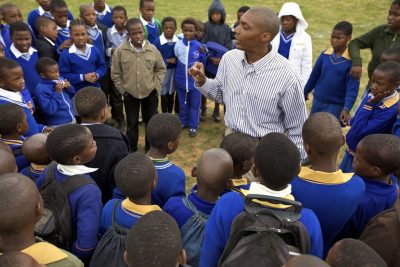
Boston University is back on the Peace Corps’ list of the top 25 volunteer-producing undergraduate schools in 2019 at No. 23.
According to a report released in March, the Peace Corps Boston University tied with the University of Missouri’s chapter for the 23rd spot among large-size schools, with 37 alumni from its undergraduate program currently volunteering in programs around the world.
Schools are divided into three categories by undergraduate student body size, with BU falling into the “large-size” of a 15,000 or greater student body. BU last made the list for most undergraduate alumni volunteers three years ago, when it ranked No. 24 in 2015.
Kathryn Fidler, public affairs specialist at the Peace Corps, said BU is a great launching point for services in the Peace Corps.
“I think that the ranking definitely highlights the fact that Boston University students have an incredible commitment to service,” Fidler said. “I think BU consistently is a great first step in that.”
In 2017, BU ranked No. 4 among graduate schools on the agency’s top volunteer-producing colleges and universities list.
The number of undergraduate alumni volunteers reported for each school includes both recent graduates who served in the Peace Corps immediately after their undergraduate studies, as well as those who waited a few years after graduation to serve, according to Fidler.
Fidler said the number of volunteers BU has produced is quite consistent. For the 2018 report, 31 Boston University alumni were serving in the Peace Corps, Fidler said.
“Because the service is 27 months and each program in each country has its own individual start date, volunteer numbers do fluctuate,” Fidler said. “So I would say that it’s quite common for schools to be on the list one year and then not be ranked on the list the next year, and then return to the list after a while.”
On March 28, Peace Corps Director Jody Olsen visited BU from Washington, D.C. to thank the BU community for being involved with Peace Corps over the years. Olsen also presented the Certificate of Appreciation/Recognition to the university.
According to Fidler, more than 1,470 Boston University alumni have served in Peace Corps since its founding in 1961.
After Olsen presented the certificate, she conducted a video call with Amir Feinberg, who graduated from BU in 2016 and is currently serving in Moldova as an education volunteer.
During the video call, Feinberg shared his daily life and work experience in Moldova, Fidler said, as well as how his undergraduate life at BU made him well-prepared for the service in the Peace Corps. Feinberg added he has been accepted into medical school and will attend after his service finishes next summer.
BU spokesperson Colin Riley said the Peace Corps’ ranking is important to the university because it speaks for the alumni volunteers’ experience as students.
“We have students from a wide range of backgrounds who have a commitment to service, to their fellow human beings,” Riley said, “and recognize that it’s an opportunity for them to get experience and have a positive impact in people around the world, their understanding of the generosity and compassion and empathy of U.S. citizens.”
Yizhou Sun, a junior in the Questrom School of Business, said as an international student, he has heard little of the Peace Corps but thinks the ranking means BU has a good atmosphere of volunteership. He said volunteering is not that popular in Questrom due to the academic competition students face.
“We’re more looking for some internships that can help our future,” Sun said.
Bridget Hallisey, a junior in the College of Arts and Sciences, said the time commitment required by the Peace Corps is one of the key concerns a student might have about volunteering with the program.
“If I’d had all the time in the world, I would love to do something like that,” Hallisey said.
Laura Dziuban, the academic programs administrator at the Center for English Language and Orientation Programs at Boston University, said she thinks the ranking shows a lot of students in BU are interested in humanitarian works.
“They’re interested in helping others, going to other places around the world, perhaps not necessarily going after big money making jobs right after graduation,” Dziuban said, “but instead doing something that has a positive impact for others.”























































































































